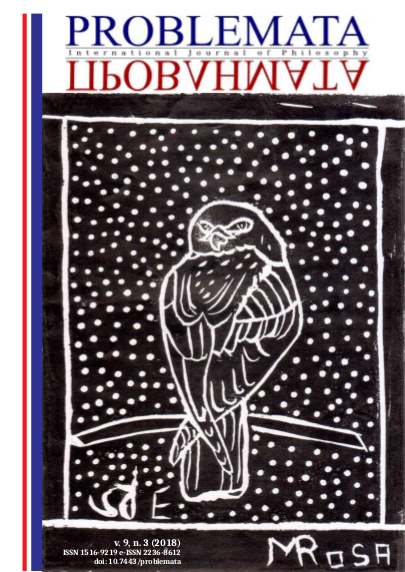POSSIBILITY OF A HERMENEUTICS OF THE SAME SECOND PAUL RICOEUR FOR THE TEACHING OF PHILOSOPHY IN MIDDLE SCHOOL
DOI:
https://doi.org/10.7443/problemata.v9i3.41656Keywords:
Constitution of the self. Experience. Philosophize. Hermeneutics.Abstract
The teaching and learning of philosophy are two important moments of the exercise and philosophical activity in the classroom, because through this activity we will seek to create, invent, reinvent and produce new knowledge and actions that are configured as a philosophical experience. The experience of philosophizing allows for greater flexibility between thinking and acting, aiming at the constitution of the student's self. Through the experience of philosophizing we understand not only the reflection, the understanding and interpretation of philosophical texts, but a self-interpretation that the subject assumes by his education, identity / constitution of himself. Through his deliberations and evaluations of his actions, the student moves to what Paul Ricoeur called "the aim of the good life with and for others in just institutions”. And to achieve this "good life with and for others in just institutions" it seems necessary the ability to order and rebuild their life experiences. To achieve this goal the subject has to interpret his own self, because the human being seeks not only to make a description of his existence in the world, he wants to interpret the meaning of his existence, which is why he has a need to understand his being world. By making this reflexive effort to take self-awareness, students can acquire new meanings and values that allow them to live in an ethical perspective that they themselves can choose between what they think is more appropriate for their life, enabling them to develop their personal projects and social responsibility with regard to their own actions. For this reason we seek to delineate the traces of a philosophical hermeneutics that provides not only rules of textual interpretation, but an understanding that can aid human existence on the basis of the creation of philosophical parameters for students to create and re-create themselves and to the world in an original and autonomous way.
Downloads
References
ASPIS, Renata Lima. Ensinar filosofia: um livro para professores. 1ª Edição. Editora: Atta Mídia e Educação. São Paulo, 2009.
______ .Fragmentos de ideias sobre ensino de filosofia e re-existência.
______. O professor de filosofia: o ensino de filosofia no ensino médio como experiência filosofia. Cad. Cedes, Campinas, vol. 24, n. 64, p. 305-320, set./dez. 2004. Disponível em ,http://www.cedes.unicamp.br>
BRASIL: MEC/SEB: Lei de Diretrizes e Bases da Educação no Brasil. Disponível em: http://portal.mec.gov.br/arquivos/pdf/ldb.pdf. Acessado em 11 jan.2018.
PALMER, Richard E. Hermenêutica. Edições 70. – Lisboa, 1969.
Ricoeur, Paul. O si-mesmo como um outro. 1ª ed. Editora WMF Martins Fontes. – São Paulo, 2014
______. Hermenêutica e ação: da hermenêutica do texto a hermenêutica da ação. 1ªed. Prometeo Libros. – Buenos Aires, 2008.
______. Teoria da interpretação: o discurso e o excesso de significação. Trad. por Artur Moão do original inglês Interpretation Theory: discourse and the surplus of meanig. Lisboa: Edições 70, 2000.
______. Del texto a la acción: ensayos de hermenêutica II. Tradução de Pablo Corona.Editora: Fondo de Cultura Económica. México, 2002.
Downloads
Published
Issue
Section
License
Authors who publish with this journal agree to the following terms:
- Authors retain copyright and grant the journal right of first publication with the work simultaneously licensed under a Creative Commons Attribution License that allows others to share the work with an acknowledgement of the work's authorship and initial publication in this journal.
- Authors are able to enter into separate, additional contractual arrangements for the non-exclusive distribution of the journal's published version of the work (e.g., post it to an institutional repository or publish it in a book), with an acknowledgement of its initial publication in this journal.
-
- Authors are permitted and encouraged to post their work online (e.g., in institutional repositories or on their website) prior to and during the submission process, as it can lead to productive exchanges, as well as earlier and greater citation of published work (See The Effect of Open Access).





